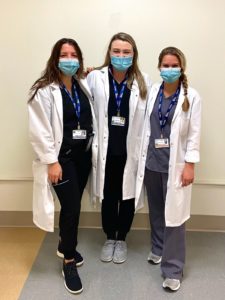Updates to this article are below in RED and published on September 17, 2020. enjoy!
During a recent Speech-Language Pathology roundtable, additional key characteristics were identified about what makes a SNF speech department great. In addition to those listed during the original publication below, consider the following:
1. An atmosphere for formal and informal communication amongst speech language pathologists while promoting team camaraderie.
2. Importance of oversight by a another SLP – this is especially important in the areas of coding and skilled therapy documentation.
3. Sharing of Ideas – SLPs can share their ideas and experience to benefit their patients while being a clinical resource to one another.
4. Ability to measure clinical and financial outcomes- It is important to measure & benchmark both PDPM SLP Component revenue as well as Medicare Part B.
5. Working through problems and solutions – Having an atmosphere where SLPs can discuss not just problems but also bring their ideas and solutions to the table.
6. Being wary of “Zoom fatigue” – Zoom has been both a blessing and a curse for 2 years. Appreciate what works well for the team in terms of making meetings productive.
One of the great things about PDPM is being able to precisely measure the value of the nursing home speech therapy department. This can be done numerically via the SLP component. SNF Administrators can now easily measure the return on investment of the speech therapy department, as long as he or she has the right tools.
Does your SNF have a top-performing Speech Therapy Department? Is there a level of accountability, teamwork, and interdisciplinary communication that the Administration expects and the residents deserve? Are your SNF speech therapists focused on reducing hospital readmissions, upgrading diets when possible, and improving quality measures? Does the speech therapy documentation support the need for skilled intervention?
Here are the 5 valuable characteristics to look for:
1. Efficiency and productivity: Everyone talks about productivity, but do you measure efficiency as well? If you have an in-house speech department with benefit-eligible employees, does the speech caseload fit only the hours they have available? If yes, you probably also have other patients who could also benefit from speech service. This is costing you a significant opportunity. When the speech caseload is less than the hours your full-timer has available, that is also a problem. In that case, you are paying for too much unproductive time. The speech hours available should fit your caseload, not the other way around. See the difference?
2. Understanding the SLP Component: According to a recent article in Skilled Nursing News, top performers are averaging 15% higher reimbursement on the SLP component compared to the middle of the pack. This means upwards of $10 ppd. Have you measured your SLP component per diem rate and benchmarked it against your peers? Understanding the nuances of properly coding is what separates the top performers from others. Specifically, this means mechanically altered diets, swallowing disorders, and speech-related comorbidities. Have you measured these items lately?
3. Treating the long-term care population: A great speech therapy department should shine while treating the long-term care population. This is where the speech-language pathologist skill set is needed to screen for dysphagia, aphasia, and cognitive communicative disorders. Treating LTC patients should make up a significant portion of the speech caseload, and also generate some nice Part B revenue. If this isn’t the case at your SNF, you are likely missing opportunities to grow the caseload. Further investigation probably is needed.
4. An infrastructure of learning: Great speech therapists crave continuous education. Patients admitted to skilled nursing facilities these days have a higher average age than ever. They also have multiple comorbidities and cognitive deficits. A great speech department has access to a network of other speech therapists. SLP colleagues can guide and mentor one another as clinicians & colleagues. This will undoubtedly raise the level of care provided at your facility. Seasoned SLPs work hard to reduce the number of patients on thickened liquids and the incidence of aspiration pneumonia.
5. FEES testing: Instrumental exams such as FEES provide the speech therapist with concrete visual evidence of aspiration. The SLP also becomes better equipped to identify the safest yet least restrictive diet possible. Plus, FEES has proven to be a safer and more cost-effective alternative to a Modified Barium Swallow.
If you are looking to improve the operational efficiency of your SNF speech therapy department, give us a call. We’d love to help.
About the Author: Matt McGarvey is VP of Business Development for Language Fundamentals. Matt holds a BS in Marketing from Le Moyne College and an MBA in Health Systems Administration from Union Graduate College.




In fact when someone doesn’t be aware of afterward its up to other visitors that
they will help, so here it happens.
It’s actually a great and useful piece of info.
I’m glad that you shared this helpful info with us.
Please keep us informed like this. Thank you for sharing.
Superb website you have here but I was wanting to know if you knew of any discussion boards that cover the same topics discussed here?
I’d really like to be a part of online community where I can get suggestions from other experienced individuals that share the same interest.
If you have any suggestions, please let me know. Thanks a lot!